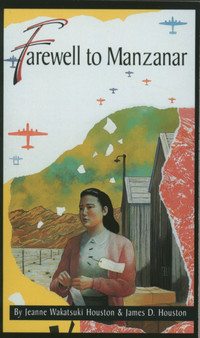by Jeanne Wakatsuki Houston and James D. Houston
Farewell to Manzanar
Reviewed by: Vincent Deng
REVIEW: Farewell to Manzanar by Jeanne Wakatsuki Houston and James D. Houston
ISBN#: 0-553-277258
THE STORY:
The Japanese attacks Pearl Harbor, bringing the USA into the Second World War. The US government then issues an order to remove and relocate all the people of Japanese heritage and put them into internment camps. The main character, Jeanne Wakatsuki and her family are on of the thousands of families to be shipped off to one of these camps. During the years at camp, the Jeanne must try to live her life normally. She attends school and other activities such as camping. She watches powerless as her family stands divided
about whether to be patriots and fight for the USA or just be bystanders. As the argument for whether to support the USA or not spreads to the entire camp, her father stands up for the side that says they should fight for the USA. This puts her family against everyone in the camp and soon she lives in a family hated by the entire camp. Soon, the camps are ruled unconstitutional, and Jeanne and her family must return to the West Coast and start all over again from the ground. Furthermore, Jeanne must endure lot’s of racism against her as the war has revived the division between Caucasians and Japanese living in America. For example, she is barred from many activities such as girl scouts and winning school competitions due to the fact that she is Japanese. After a while, she comes to terms with herself that she is worth something and doesn’t owe the public for being of Japanese descent and settles down.
MY OPINION:
At first, I thought this story was going to be another one of the historical fiction books that blast “USA is the greatest” at the reader in every page. I couldn't be more surprised. This book focuses more on the dark side of USA’s history. It also gives the reader an unique perspective on one of the least known moments in WW2 which shows that war isn’t just glory and death, but a battle at home too. The author uses descriptive language in the story but as it is told from her younger self’s perspective, the reader will have to infer how serious some matters are as the author doesn’t state it in her writing and instead gives hints about the seriousness. This story also teaches about racial discrimination, something that is resurfacing in modern society. I would rate this book to be 10 out of 10 stars and I would recommend it for older middle schoolers or younger high schoolers as it has sensitive topics about racism.
STUDY QUESTIONS AND VOCABULARY:
FIRST SECTION
1. Why did the government imprison all the Japanese living in the USA?
1a. The Japanese were imprisoned because the government were afraid of the Japanese aiding the enemy.(pg 8)
2. Who is the head of the Wakatsuki family?
2a. The main character’s father is the head of the family. (pg 15)
3. Why do the Caucasians hate the Japanese Americans?
3a. The Caucasians hate the Japanese Americans because of the Japanese Attack on Pearl Harbor. (pg 16)
4. What is the narrator’s father “interviewed” about?
4a. The narrator’s father is “interviewed” about his loyalties to the USA and Japan. (pg 60)
5. What type of person was the narrator’s father?
5a. He was and arrogant and prideful man. (pg 65)
Armada(pg 5)
Patriarch (pg 15)
Concoction (pg 20)
Promenade (pg 40)
Braggart (pg 58)
MIDDLE SECTION
6. Why did the crowds of people join the mob?
6a. They joined the mob because they were sick of the injustice and the arrest of the young cook. (pg 74)
7. Why did the US government issue the Application for Leave Clearance?
7a. They issued the application to find candidates in the internment camps that could be drafted into the army.(pg 81)
8. Who was the one to be drafted despite his father’s wishes?
8a. Woody was drafted and agreed to serve, despite his father’s wishes. (pg 121)
9. How many Supreme Court cases were ruled on before the camps were finally deemed unconstitutionally?
9a. There were three cases that were ruled on the before the camps were finally closed. (pg 125)
10. Why were the Japanese Americans afraid of resettling on the West Coast?
10a. They were afraid of racist groups such as the KKK and the Home Front Commandos. (pg-127)
Lynch (pg 74)
Corral (pg 84)
Repatriation (pg 86)
Asunder (pg 124)
Rescinded (pg 126)
LAST SECTION
11. What does the father decide to do when it is announced that the camps will be closed no matter what?
11a. The father decides to do and buy a car to move the family to Southern California.
12. Why was the main character so tolerant of racial injustices?
12a. The main character felt she owed the population something for being of Japanese descent and therefore she is tolerant of racial discrimination.
13. Why did her father seem to “shrink” in the years after the war?
13a. Her father seemed to “shrink” because he was no longer the man that supported everyone and instead was depending on his son's’ support
14. Why did Leonard stand up for the main character?
14a. He did it because he thought it was unfair that the school officials were going to take away the main character’s victory just because she was of Japanese descent. (pg-175
15. How did the main character “betray” her father?
15a. She “betrayed” her father by not becoming the ideal Japanese woman and instead becoming more American.
urn (pg 145)
lethargy (pg 149)
castrator (pg 154)
gaudiness (pg 164)
incongruous (pg 191)

No comments:
Post a Comment
We encourage constructive comments about our book reviews. Please use only standard English.